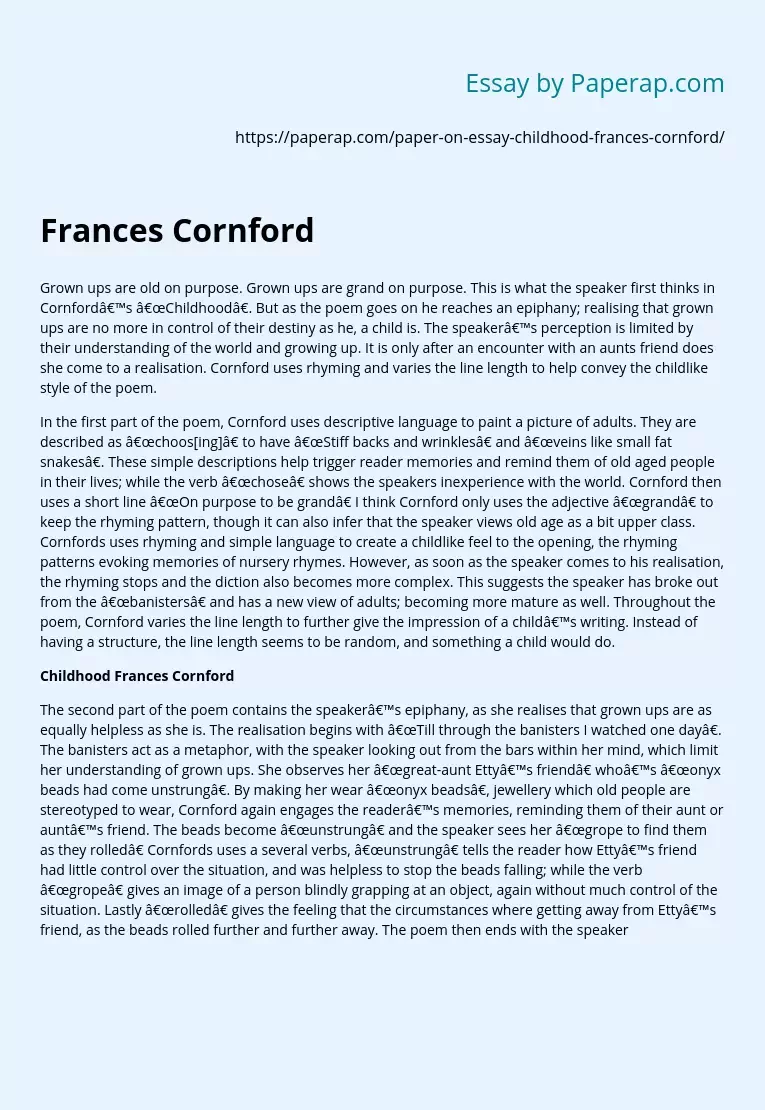Frances Cornford
Grown ups are old on purpose. Grown ups are grand on purpose. This is what the speaker first thinks in Cornford’s “Childhood”. But as the poem goes on he reaches an epiphany; realising that grown ups are no more in control of their destiny as he, a child is. The speaker’s perception is limited by their understanding of the world and growing up. It is only after an encounter with an aunts friend does she come to a realisation.
Cornford uses rhyming and varies the line length to help convey the childlike style of the poem.
In the first part of the poem, Cornford uses descriptive language to paint a picture of adults. They are described as “choos[ing]” to have “Stiff backs and wrinkles” and “veins like small fat snakes”. These simple descriptions help trigger reader memories and remind them of old aged people in their lives; while the verb “chose” shows the speakers inexperience with the world.
Cornford then uses a short line “On purpose to be grand” I think Cornford only uses the adjective “grand” to keep the rhyming pattern, though it can also infer that the speaker views old age as a bit upper class. Cornfords uses rhyming and simple language to create a childlike feel to the opening, the rhyming patterns evoking memories of nursery rhymes. However, as soon as the speaker comes to his realisation, the rhyming stops and the diction also becomes more complex. This suggests the speaker has broke out from the “banisters” and has a new view of adults; becoming more mature as well.
Throughout the poem, Cornford varies the line length to further give the impression of a child’s writing. Instead of having a structure, the line length seems to be random, and something a child would do.
Childhood Frances Cornford
The second part of the poem contains the speaker’s epiphany, as she realises that grown ups are as equally helpless as she is. The realisation begins with “Till through the banisters I watched one day”. The banisters act as a metaphor, with the speaker looking out from the bars within her mind, which limit her understanding of grown ups. She observes her “great-aunt Etty’s friend” who’s “onyx beads had come unstrung”. By making her wear “onyx beads”, jewellery which old people are stereotyped to wear, Cornford again engages the reader’s memories, reminding them of their aunt or aunt’s friend. The beads become “unstrung” and the speaker sees her “grope to find them as they rolled” Cornfords uses a several verbs, “unstrung” tells the reader how Etty’s friend had little control over the situation, and was helpless to stop the beads falling; while the verb “grope” gives an image of a person blindly grapping at an object, again without much control of the situation. Lastly “rolled” gives the feeling that the circumstances where getting away from Etty’s friend, as the beads rolled further and further away. The poem then ends with the speaker realising that grown ups are “helplessly old” as she is “helplessly young”. Cornford repetition of the adjective “helplessly” conveys the mutual weakness and powerlessness of the two characters and also provides a nice round ending to the poem.
At the start of the poem, the speaker is a naive child, who believes Grown ups chose to age so they could “be grand”. But by the end, he realises that they are not so different. Cornford portrays the limitation of peoples understanding on topics in “Childhood” with a simple example of a child’s view of grown ups. Her use of simple language creates the effect of a child’s writing and helps gives the poem a light-hearted tone.
Frances Cornford. (2019, Dec 05). Retrieved from https://paperap.com/paper-on-essay-childhood-frances-cornford/

